最新一般将来时,过去将来时讲解及练习
- 格式:doc
- 大小:18.50 KB
- 文档页数:2
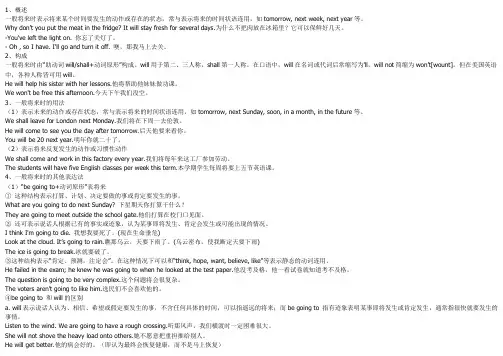
1、概述一般将来时表示将来某个时间要发生的动作或存在的状态,常与表示将来的时间状语连用,如tomorrow, next week, next year等。
Why don’t you put the meat in the fridge? It will stay fresh for several days.为什么不把肉放在冰箱里?它可以保鲜好几天。
-You've left the light on. 你忘了关灯了。
- Oh , so I have. I'll go and turn it off. 噢,那我马上去关。
2、构成一般将来时由“助动词will/shall+动词原形”构成。
will用于第二、三人称,shall第一人称。
在口语中,will在名词或代词后常缩写为'll,will not简缩为won’t[wount]。
但在美国英语中,各种人称皆可用will。
He will help his sister with her lessons.他将帮助他妹妹做功课。
We won't be free this afternoon.今天下午我们没空。
3、一般将来时的用法(1)表示未来的动作或存在状态,常与表示将来的时间状语连用,如tomorrow, next Sunday, soon, in a month, in the future等。
We shall leave for London next Monday.我们将在下周一去伦敦。
He will come to see you the day after tomorrow.后天他要来看你。
You will be 20 next year.明年你就二十了。
(2)表示将来反复发生的动作或习惯性动作We shall come and work in this factory every year.我们将每年来这工厂参加劳动。
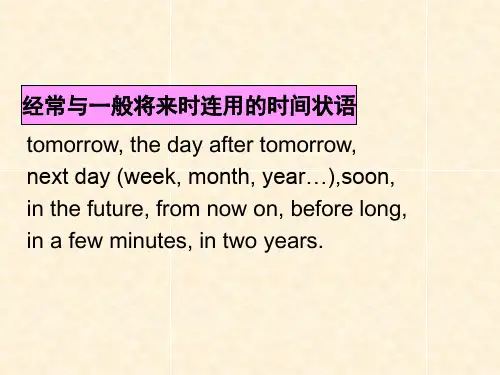
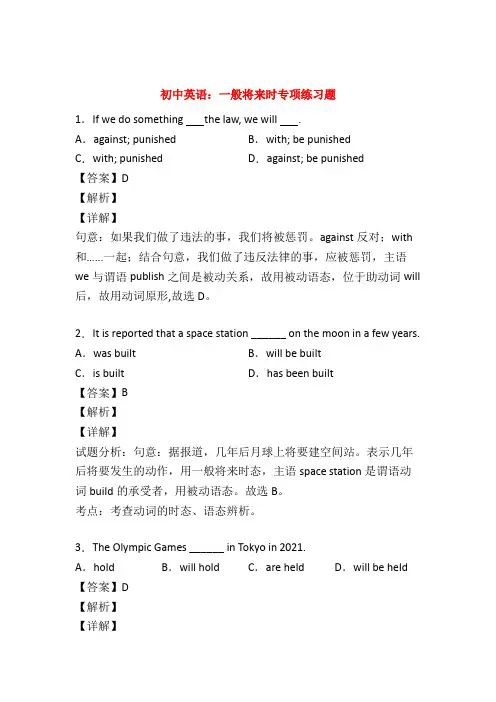
初中英语:一般将来时专项练习题1.If we do something the law, we will .A.against; punished B.with; be punishedC.with; punished D.against; be punished【答案】D【解析】【详解】句意:如果我们做了违法的事,我们将被惩罚。
against反对;with 和…...一起;结合句意,我们做了违反法律的事,应被惩罚,主语we与谓语publish之间是被动关系,故用被动语态,位于助动词will 后,故用动词原形,故选D。
2.It is reported that a space station ______ on the moon in a few years. A.was built B.will be builtC.is built D.has been built【答案】B【解析】【详解】试题分析:句意:据报道,几年后月球上将要建空间站。
表示几年后将要发生的动作,用一般将来时态,主语space station是谓语动词build的承受者,用被动语态。
故选B。
考点:考查动词的时态、语态辨析。
3.The Olympic Games ______ in Tokyo in 2021.A.hold B.will hold C.are held D.will be held 【答案】D【解析】【详解】句意:奥运会将于2021年在东京举行。
考查被动语态。
hold一般现在时;will hold一般将来时;are held一般现在时的被动语态;will be held 一般将来时的被动语态。
根据“in 2022(将来的时间)”可知此句时态是一般将来时,可排除AC选项。
主语“The 24 Winter Olympics”是动词held的受动者,需使用被动语态,可知使用被动语态,故选D。
4.A new mobile cabin hospital(方舱医院) ________ next time you come here.A.is completed B.was completed C.completedD.will be completed【答案】D【解析】【详解】句意:下次你来这的时候,一个新的可移动方舱医院将会完工。
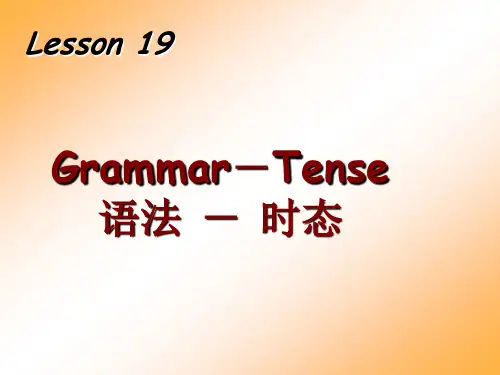
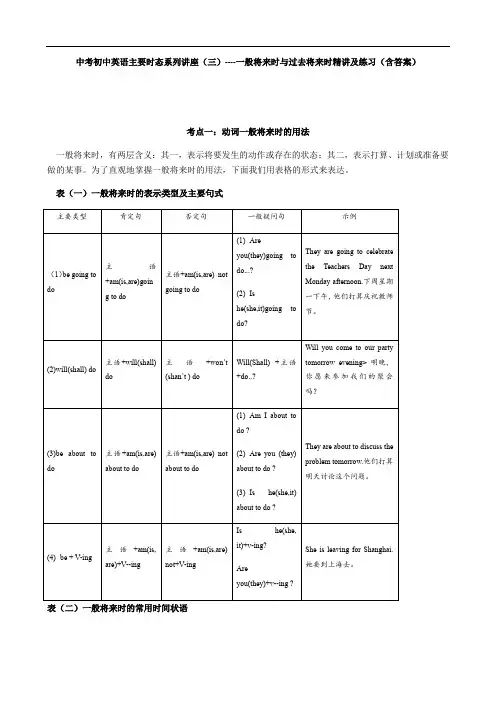
中考初中英语主要时态系列讲座(三)----一般将来时与过去将来时精讲及练习(含答案)考点一:动词一般将来时的用法一般将来时,有两层含义:其一,表示将要发生的动作或存在的状态;其二,表示打算、计划或准备要做的某事。
为了直观地掌握一般将来时的用法,下面我们用表格的形式来表达。
表(一)一般将来时的表示类型及主要句式表(二)一般将来时的常用时间状语表Array(三)一般将来时的主要用法【典型考例1】(2019天津)---What is your plan for next weekend,Lingling?----I volunteer work in the museum.A. was doingB. didC. have doneD. am going to do【析】正确答案D。
句意是:玲玲,下周末的安排是什么?我打算到博物馆去作志愿者。
根据上文的next weekend(下周末)可知,玲玲的回答是指下周的打算,所以用一般将来时,因此,正确答案为D。
【典型考例】(2019四川内江)---Have you watched the new movie,Joe?---No,I________ it with my sister this evening.A.watch B.are watching C.watched D.will watch【析】正确答案:D。
句意是:乔,你看了这部新电影吗?没有。
我今晚将和我妹妹一起去看。
根据本句末的时间状语this evening可知,看新电影这动作是将来要做的事情,因此动词使用一般将来时。
所以,正确答案为D。
【典型考例】(2019天津)----Could you tell me for the fruit?----By paying over the Internet.A. how much will I payB. how much I will payC. how will I payD. how I will pay【析】正确答案D。
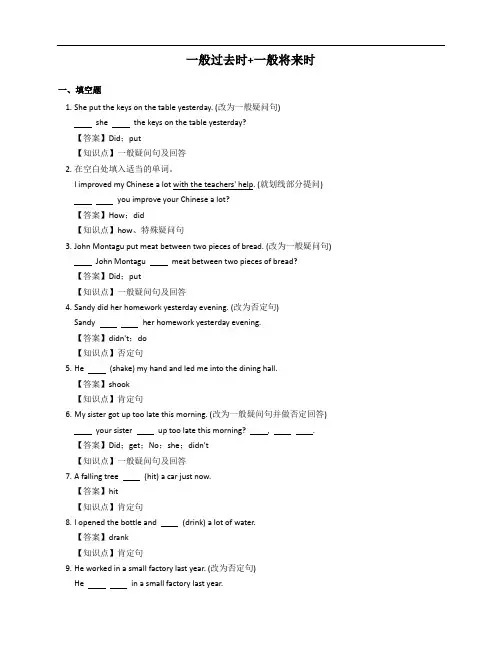
一般过去时+一般将来时一、填空题1.She put the keys on the table yesterday. (改为一般疑问句)she the keys on the table yesterday?【答案】Did;put【知识点】一般疑问句及回答2.在空白处填入适当的单词。
I improved my Chinese a lot with the teachers' help. (就划线部分提问)you improve your Chinese a lot?【答案】How;did【知识点】how、特殊疑问句3.John Montagu put meat between two pieces of bread. (改为一般疑问句)John Montagu meat between two pieces of bread?【答案】Did;put【知识点】一般疑问句及回答4.Sandy did her homework yesterday evening. (改为否定句)Sandy her homework yesterday evening.【答案】didn't;do【知识点】否定句5.He (shake) my hand and led me into the dining hall.【答案】shook【知识点】肯定句6.My sister got up too late this morning. (改为一般疑问句并做否定回答)your sister up too late this morning? , .【答案】Did;get;No;she;didn't【知识点】一般疑问句及回答7.A falling tree (hit) a car just now.【答案】hit【知识点】肯定句8.I opened the bottle and (drink) a lot of water.【答案】drank【知识点】肯定句9.He worked in a small factory last year. (改为否定句)He in a small factory last year.【答案】didn't;work【知识点】否定句10.A little bird (fly) in through the open window and she set it free at once.【答案】flew【知识点】肯定句11.Peter used to take risks when he was young. (改为一般疑问句)Peter to take risks when he was young?【答案】Did;use【解析】考查一般疑问句。
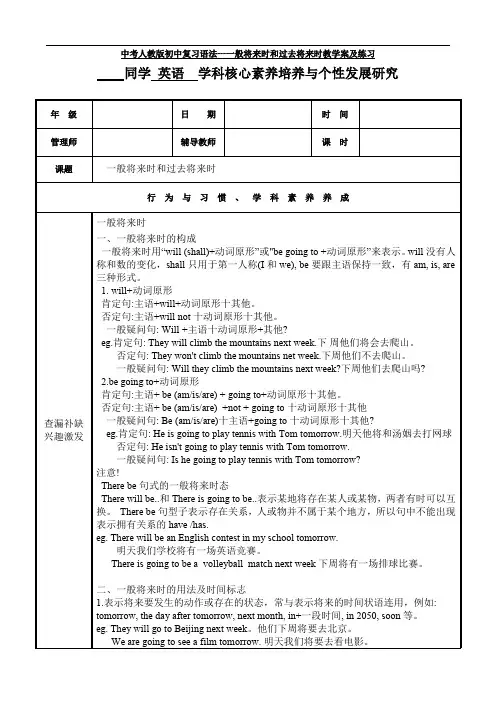
中考人教版初中复习语法---一般将来时和过去将来时教学案及练习同学英语学科核心素养培养与个性发展研究巩固练习一.选择填空1. Li Ming said he _____happy if Brian_____to China next month.A. as; comeB. was; would comeC. would be; cameD. will be; come2. Jenny said she _____her holiday in China.A. spentB. would spentC. was going to spentD. would spend3. —What did your son say in the letter?—He told me that he ______ the Disney World the next day.A. will visitB. has visitedC. is going to visitD. would visit4. Father said that he ______ me to Beijing the next year.A. tookB. would takeC. takesD. will take5. We were not sure whether they ______ more vegetables.A. are going to growB. were going to growC. will growD. have grown6. She ______ to work when the telephone rang.A. is goingB. will goC. was about to goD. is to go7. – Where is the morning paper? – I ________ if for you at once.A. getB. am gettingC. to getD. will get8. ________ a concert next Saturday?A. There will beB. Will there beC. There can beD. There are9. If they come, we ________ a meeting.A. haveB. will haveC. hadD. would have10. He ________ her a beautiful hat on her next birthday.A. givesB. gaveC. will givingD. is going to give11. He ________ to us as soon as he gets there.A. writesB. has writtenC. will writeD. wrote12. He ________ in three days.A. coming backB. came backC. will come backD. is going to coming back13. If it ________ tomorrow, we’ll go roller-skating.A. isn’t rainB. won’t rainC. doesn’t rainD. doesn’t fine14. – Will his parents go to see the Terra Cotta Warriors tomorrow? – No, ____(不去).A. they willn’t.B. they won’t.C. they aren’t.D. they don’t.15. We ________ the work this way next time.A. doB. will doC. going to doD. will doing16. Tomorrow he ________ a kite in the open air first, and then ________ boating in the park.A. will fly; will goB. will fly; goesC. is going to fly; will goesD. flies; will go17. The day after tomorrow they ________ a volleyball match.A. will watchingB. watchesC. is watchingD. is going to watch18. There ________ a birthday party this Sunday.A. shall beB. will beC. shall going to beD. will going to be19. They ________ an English evening next Sunday.A. are havingB. are going to haveC. will havingD. is going to have20. ________ you ________ free next Sunday?A. Will; areB. Will; beC. Do; beD. Are; be二. 用所给动词的适当形式填空1. Miss Zhang said she ________(visit) the Great Wall next summer.2. She told him that she ________(not stay) here for long.3. I wasn’t sure whether Lucy_______(come) the next year.4. The scientists said the world’s population _______ (slow) down in future.5. She said the bus _______(leave) at five the next morning.6. I wasn't sure whether he _______(lend) me his book the next morning.7. He was fifty-six. In two years he _______(be) fifty-eight.8. Whenever she has time, she ______(help) them in their work.一、英语阅读理解专项练习试卷1.阅读理解I have a neighbour we call"Happy".I have never seen her angry at anything and never heard her say a bad word to anyone or about anyone.Happy and her husband Ben,70,have a huge garden.They spent many happy hours together working on it.Most of the neighbours watched interestingly as Ben doubled the size of their garden.As the cost of food climbed faster than Ben's beans,we all wished we also had such a large garden.As the rest of us spent our dollars at the market,Happy could be seen picking beans in her back yard.Last month,Happy and Ben invited most of the neighbours over for an "all-day food fest(聚会)".We were told to bring gloves and arrive very early in the morning.We didn't know what was about to take place.By 9:00a.m.,there were nine of us in the garden picking tomatoes,beans,cabbages,carrots and pumpkins.By 10:00a.m.,there was lots of laughter.We shared a lot of stories.By 5:00p.m.,everyone was a little drunk from the wine and beer.After dinner,we played games.As we were leaving,Happy and Ben handed each of us a shopping bag filled with vegetables picked that day.What a delightful gift!Well,the point wasn't so much about the food.The true gift was a day of friends getting together.This party would not have happened if it had not been for Happy and Ben's garden.Now they have a blog about gardening.We can read their blog for advice on planting our garden.Thanks to them,I am so proud of my new tomato plants!(1)We can infer that Happy and her husband Ben .A. don't like spending time with others.B. sometimes quarrel with each other.C. live on the food they grow in their garden.D. are happy to share what they have with others.(2)According to paragraph 2,people wish they also had a garden so that .A. they didn't have to spend so much money on food.B. they could grow vegetables and sell at the market.C. they could invite their neighbours and hold parties in it.D. they could spend happy times together with their family in it.(3)Happy and Ben invited the neighbours to their garden .A. to attend a birthday party.B. to help them get to know each other.C. to enjoy what they grew in the garden.D. to share some interesting stories.(4)Which of the following is the right order according to the passage?a.We drank wine and beer,shared stories and laughter.b.We picked tomatoes,beans,cabbages,carrots and pumpkins.c.We received Happy and Ben's invitation.d.Happy and Ben gave each of us a shopping bag filled with vegetables.e.We went to their house with gloves very early in the morning.A. e﹣b﹣c﹣a﹣dB. c﹣b﹣e﹣a﹣dC. c﹣e﹣b﹣a﹣dD. e﹣b﹣c﹣d﹣a(5)What did the writer most probably think of the time he spent in the garden?A. It was too long.B. It was wonderful.C. It was not as good as he thought.D. It was too terrible.【答案】(1)D(2)A(3)B(4)C(5)B【解析】【分析】短文大意:文章主要讲述的是两个老人在种菜,之后邀请周围的邻居到家里做客,他们采摘并分享新鲜的蔬菜,分享生活中快乐的瞬间。
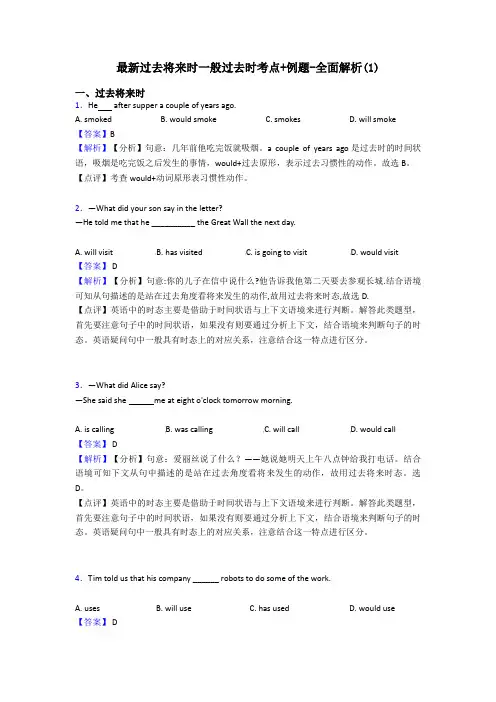
最新过去将来时一般过去时考点+例题-全面解析(1)一、过去将来时1.He after supper a couple of years ago.A. smokedB. would smokeC. smokesD. will smoke【答案】B【解析】【分析】句意:几年前他吃完饭就吸烟。
a couple of years ago是过去时的时间状语,吸烟是吃完饭之后发生的事情,would+过去原形,表示过去习惯性的动作。
故选B。
【点评】考查would+动词原形表习惯性动作。
2.—What did your son say in the letter?—He told me that he __________ the Great Wall the next day.A. will visitB. has visitedC. is going to visitD. would visit【答案】 D【解析】【分析】句意:你的儿子在信中说什么?他告诉我他第二天要去参观长城.结合语境可知从句描述的是站在过去角度看将来发生的动作,故用过去将来时态,故选D.【点评】英语中的时态主要是借助于时间状语与上下文语境来进行判断。
解答此类题型,首先要注意句子中的时间状语,如果没有则要通过分析上下文,结合语境来判断句子的时态。
英语疑问句中一般具有时态上的对应关系,注意结合这一特点进行区分。
3.—What did Alice say?—She said she me at eight o'clock tomorrow morning.A. is callingB. was callingC. will callD. would call【答案】 D【解析】【分析】句意:爱丽丝说了什么?——她说她明天上午八点钟给我打电话。
结合语境可知下文从句中描述的是站在过去角度看将来发生的动作,故用过去将来时态。
选D。
【点评】英语中的时态主要是借助于时间状语与上下文语境来进行判断。
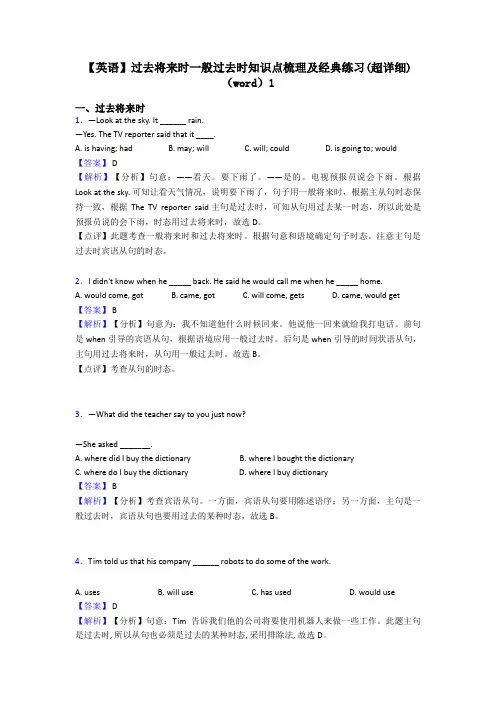
【英语】过去将来时一般过去时知识点梳理及经典练习(超详细)(word)1一、过去将来时1.—Look at the sky. It ______ rain.—Yes. The TV reporter said that it ____.A. is having; hadB. may; willC. will; couldD. is going to; would【答案】 D【解析】【分析】句意:——看天。
要下雨了。
——是的。
电视预报员说会下雨。
根据Look at the sky. 可知让看天气情况,说明要下雨了,句子用一般将来时,根据主从句时态保持一致,根据The TV reporter said主句是过去时,可知从句用过去某一时态,所以此处是预报员说的会下雨,时态用过去将来时,故选D。
【点评】此题考查一般将来时和过去将来时。
根据句意和语境确定句子时态。
注意主句是过去时宾语从句的时态。
2.I didn't know when he _____ back. He said he would call me when he _____ home.A. would come, gotB. came, gotC. will come, getsD. came, would get【答案】 B【解析】【分析】句意为:我不知道他什么时候回来。
他说他一回来就给我打电话。
前句是when引导的宾语从句,根据语境应用一般过去时。
后句是when引导的时间状语从句,主句用过去将来时,从句用一般过去时。
故选B。
【点评】考查从句的时态。
3.—What did the teacher say to you just now?—She asked _______.A. where did I buy the dictionaryB. where I bought the dictionaryC. where do I buy the dictionaryD. where I buy dictionary【答案】 B【解析】【分析】考查宾语从句。
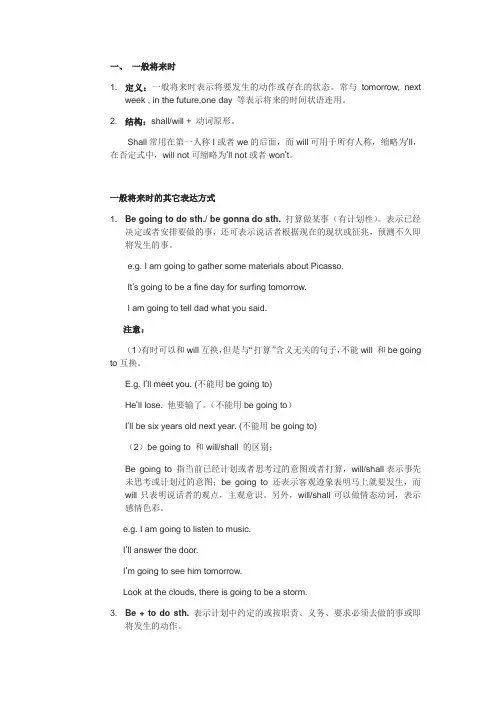
一、一般将来时1. 定义:一般将来时表示将要发生的动作或存在的状态。
常与tomorrow, nextweek , in the future,one day 等表示将来的时间状语连用。
2. 结构:shall/will + 动词原形。
Shall常用在第一人称I或者we的后面,而will可用于所有人称,缩略为’ll,在否定式中,will not可缩略为’ll not或者won’t。
一般将来时的其它表达方式1. Be going to do sth./ be gonna do sth. 打算做某事(有计划性)。
表示已经决定或者安排要做的事,还可表示说话者根据现在的现状或征兆,预测不久即将发生的事。
e.g. I am going to gather some materials about Picasso.It’s going to be a fine day for surfing tomorrow.I am going to tell dad what you said.注意:(1)有时可以和will互换,但是与“打算”含义无关的句子,不能will 和be going to互换。
E.g. I’ll meet you. (不能用be going to)He’ll lose. 他要输了。
(不能用be going to)I’ll be six years old next year. (不能用be going to)(2)be going to 和will/shall 的区别:Be going to 指当前已经计划或者思考过的意图或者打算,will/shall表示事先未思考或计划过的意图;be going to 还表示客观迹象表明马上就要发生,而will只表明说话者的观点,主观意识。
另外,will/shall可以做情态动词,表示感情色彩。
e.g. I am going to listen to music.I’ll answer the door.I’m going to see him tomorrow.Look at the clouds, there is going to be a storm.3. Be + to do sth.表示计划中约定的或按职责、义务、要求必须去做的事或即将发生的动作。
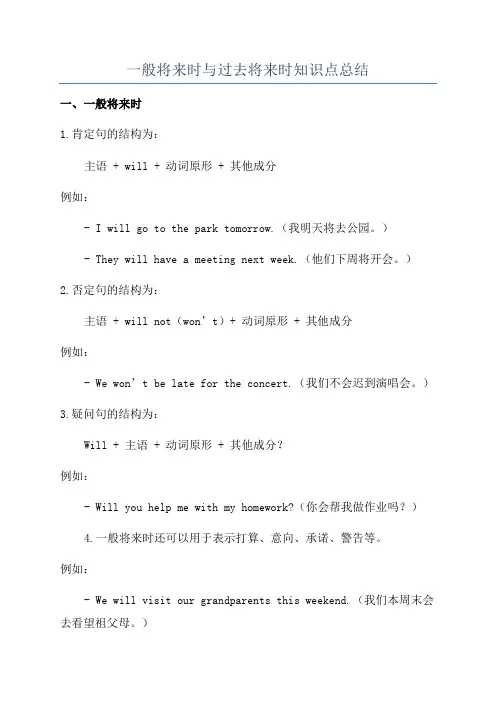
一般将来时与过去将来时知识点总结一、一般将来时1.肯定句的结构为:主语 + will + 动词原形 + 其他成分例如:- I will go to the park tomorrow.(我明天将去公园。
)- They will have a meeting next week.(他们下周将开会。
)2.否定句的结构为:主语 + will not(won’t)+ 动词原形 + 其他成分例如:- We won’t be late for the concert.(我们不会迟到演唱会。
)3.疑问句的结构为:Will + 主语 + 动词原形 + 其他成分?例如:- Will you help me with my homework?(你会帮我做作业吗?)4.一般将来时还可以用于表示打算、意向、承诺、警告等。
例如:- We will visit our grandparents this weekend.(我们本周末会去看望祖父母。
)- He will work hard to pass the exam.(他会努力学习以通过考试。
)- I won’t accept the j ob offer.(我不会接受这个工作机会。
)5.当表示将来的时间或条件时,可以使用其他时间状语或条件从句来修饰。
例如:二、过去将来时过去将来时用于表示过去一些时间将要发生的动作或状态,一般由助动词"would"或"should"加上动词的原形构成。
1.肯定句的结构为:主语 + would / should + 动词原形 + 其他成分例如:- She said she would meet me at the airport yesterday.(她说她昨天会在机场接我。
)- They knew they should finish their homework before going out.(他们知道他们应该在出去之前完成作业。
一般将来时和过去将来时的用法一、一般将来时表示在现在看来即将要发生的动作或存在的状态。
1、“will/shall+动词原形”表示客观上势必将发生的事情或临时做出的打算。
Shall用于第一人称,will用于第二人称。
Later I shall tell you about some of the work I have done.Next month we will have our school open day.记一记:常与一般将来时连用的时间状语有:next time,tomorrow,before long,in the future,later on,the day after tomorrow等。
2、be going to+动词原形,表示将来。
表示主观计划、打算做某事或根据某种迹象表明某事即将要发生。
(1)表示主语的意图,即将做某事。
What are you going to do tomorrow?(2)表示按计划、安排要发生的事。
The play is going to be produced next month.这部戏下月开播。
(3)表示根据某种迹象表明要发生的事。
Look at the dark clouds. It is going to rain.3、be to do 表示按计划、约定或按职责、义务必须去做的事情或即将发生的动作。
We are to discuss the report next Saturday.注意:be to do 和be going to的区别:be to do表示客观安排或受人指示而做某事,be going to 表示主观的打算或计划。
I am to play football tomorrow. 明天下午我去踢球。
(客观安排)I am going to play football tomorrow. 明天下午我想去体足球。
(主观打算)4、be about to do 表示不久或即将要发生的动作,一般不与时间状语连用。
一般将来时讲解(附习题+答案)一、一般将来时的含义:表示动作发生在将来二、一般将来时的句型:(1) will/shall+动词原形(2) be going to+动词原形三、一般将来时的时间状语:tomorrow(明天)、the day after tomorrow(后天)、next...(下一...): next week(下一周)、next year(明年)、next month(下个月)in+一段时间(...之后): in three days(三天之后)、in the future在未来this evening(今天晚上)四、一般将来时的句型结构:(1) will/shall+动词原形(will not =won’t)(will 各种人称均可用,shall 只能用于第一人称)1)肯定句:主语+will/shall+动词原型...如:I will go to school tomorrow.我明天将会去学校He will go to school tomorrow.他明天将会去学校。
2)否定句:主语+will/shall+not+动词原型...如:I won’t go to school tomorrow.我明天将不会去学校。
He won’t go to school tomorrow.他明天将不会去学校。
3)一般疑问句:Will/Shall +主语+动词原型...如:Will you go to school tomorrow?你明天要去学校吗?Will he go to school tomorrow?他明天要去学校吗?肯定回答:Yes, 主语+will.如:Yes, I will.Yes, he will.否定回答:No,主语+will+not.如:No, I won’t.No, he won’t.4) 特殊疑问句:特殊疑问词+will/shall+主语+动词原型...如:What will you do tomorrow?你明天将会做什么?What will he do tomorrow?他明天将会做什么?(2) be going to+动词原形1)肯定句:主语+be going to +动词原型...如:I am going to buy some books tomorrow.我明天打算去买一些书。
最新版初中英语主要时态系列(二)------ 一般将来时与过去将来时精讲及练习(有答案)一、一般将来时的含义:一般将来时表示将来某个时间要发生的动作或状态,或将来经常发生的动作或状态。
二、一般将来时的基本结构1. will/shall+动词原形will 在陈述句中用于各种人称;shall用于第一人称,常被will 所代替。
否定式:will not=won't;shall not=shan't一般疑问式:will/shall+主语+动词原形+其他?特殊疑问式:特殊疑问词+一般疑问式?I will/shall do a better job next time. 下次我要做得好些。
Oil and water will not mix. 油和水没法混在一起。
—Will he help you with your English tonight? 今天晚上他会帮助你学习英语吗?—Yes, he will./No, he won't. 是的,他会。
/不,他不会。
—When will you arrive for America? 你什么时候去美国?—Tomorrow. 明天。
2. am/is/are going to +动词原形否定式:am/is/are not going to +动词原形一般疑问式:am/is/are +主语+ going to + 动词原形+其他?特殊疑问式:特殊疑问词+一般疑问式?He is going to spend his holidays in London. 他打算在伦敦度假。
Look at the dark clouds. There is going to be a storm. 看那乌云,快要下雨了。
Is he going to collect any data for us? 他会帮我们收集数据吗?What are you going to do tomorrow? 明天你打算作什么?三、一般将来时的用法will+动词原形与am/is/are going to +动词原形的用法虽然都表示将来发生动作或情况,一般情况下能互换。
初中一般将来时讲义【含答案】一、一般将来时的定义表示将来某个时间发生的动作或状态二、一般将来时的结构I will meet you at the airport. I’m going to go hiking this weekend.结构:结构:三、will和be going to do的区别:1. be going to表示主观上计划或安排将要去做的事情2. will多用于客观上要发生的事情,或临时决定要做的事情四、句式转换1. I’m going to take a photo tomorrow.(否定句)(一般疑问句,并写出肯否回答)(对划线部分进行提问:I’m going to take a photo tomorrow.)2. He will finish his homework.(否定句)(一般疑问句,并写出肯否回答)(对划线部分进行提问:He will finish his homework.)五、一般将来时的标志词1. tomorrow类:tomorrow afternoon,the day after tomorrow2. next类:next week, next summer, next year3. in+时间段:in two days, in a week4.其他:in the future, one day, someday【课堂练习】1. We don’t know when __________ next week. Please call me when he arrives.A. will he arriveB. does he arriveC. he will arriveD. he arrives2. —How soon will he come back to Guangzhou?—I have no idea. Maybe he __________ in one or two days.A. will comeB. comesC. comeD. came3. ---will the train arrive?---It the station in 50 minutes.A. How soon; will get toB. How soon; arriveC. How long; will reachD. How far; gets to4. Will you at the bus stop at 10:30?A. meetingB. meetsC. meetD. met5. Lily and I to the concert it we free next week.A. go; areB. go; will beC. will go; will beD. will go; are初中一般将来时讲义(答案)一、一般将来时的定义表示将来某个时间发生的动作或状态二、一般将来时的结构I will meet you at the airport. I’m going to go hiking this weekend.结构:will+动词原形结构:am/is/are going to+动词原形三、will和be going to do的区别:1. be going to表示主观上计划或安排将要去做的事情2. will多用于客观上要发生的事情,或临时决定要做的事情四、句式转换1. I’m going to take a photo tomorrow.(否定句)I’m not going to take a photo tomorrow.(一般疑问句,并写出肯否回答)---Are you going to take a photo tomorrow?---Yes, I am. / No, I’m not.(对划线部分进行提问:I’m going to take a photo tomorrow.)What are you going to do tomorrow?2. He will finish his homework.(否定句)He will not finish his homework.(一般疑问句,并写出肯否回答)---Will he finish his homework?---Yes, he will. /No, he won’t.(对划线部分进行提问:He will finish his homework.)What will he do?五、一般将来时的标志词1. tomorrow类:tomorrow afternoon,the day after tomorrow2. next类:next week, next summer, next year3. in+时间段:in two days, in a week4.其他:in the future, one day, someday【课堂练习】1. We don’t know when __________ next week. Please call me when he arrives.A. will he arriveB. does he arriveC. he will arriveD. he arrives2. —How soon will he come back to Guangzhou?—I have no idea. Maybe he __________ in one or two days.A. will comeB. comesC. comeD. came3. ---will the train arrive?---It the station in 50 minutes.A. How soon; will get toB. How soon; arriveC. How long; will reachD. How far; gets to4. Will you at the bus stop at 10:30?A. meetingB. meetsC. meetD. met5. Lily and I to the concert it we free next week.A. go; areB. go; will beC. will go; will beD. will go; are。
一般将来时与过去将来时知识点总结一、一般将来时(Simple Future Tense):1. 构成:将来时的一般肯定句由“助动词will + 动词原形”构成,即主语 + will + 动词原形。
2. 否定形式:在助动词will后面加上not,即will not 或won't。
3. 疑问形式:将助动词will提前到句首,即will + 主语 + 动词原形。
4.使用场景:a.表示对未来的预测、判断或意愿。
b.表示承诺、决心或意愿。
c.表示请求、邀请或建议。
d.表示命令或指示。
5.注意事项:a. 不要将will和shall混淆使用,shall一般只用于第一人称(I和we)的疑问句和建议句中。
b. 有时可以使用be going to + 动词原形来表示将来时,特别是当我们对未来发生的事情有较强的信心或根据已有的证据得出结论时。
二、过去将来时(Future in the Past Tense):1. 构成:过去将来时的构成由“助动词would + 动词原形”或“was/were going to + 动词原形”构成。
2.使用场景:a.表示对过去事情发生的预测、计划或意愿。
b.表示对过去人对未来发生的动作、事件或情况的预测或假设。
3.注意事项:a.过去将来时一般只用于过去发生的陈述句、疑问句和条件句中。
b.过去将来时不会出现在与现在相关的时间状语从句中,而是与过去相关的时间状语从句中。
例如:1. I will go to the party tomorrow evening.(我明天晚上要去参加派对。
)2. He won't be there next week.(下周他不会在那里。
)3. Will you help me with my homework?(你会帮我做作业吗?)4. The teacher will explain the lesson tomorrow.(老师明天会解释这课。
【英语】过去将来时一般过去时知识点梳理及经典练习(超详细)经典一、过去将来时1.Jerry told me he ___________ on an old man's eyes in the hospital this Sunday.A. will operateB. would operateC. operatedD. has operated【答案】 B【解析】【分析】句意:杰瑞告诉我,这个星期天他要在医院给一个老人的眼睛做手术。
operate做手术,实义动词。
this Sunday表明时态是将来时,told是过去式,所以用过去将来时,结构是would+动词原形,所以用would operate,故选B。
【点评】考查过去将来时,注意平时识记其结构。
2.Mr. Wu said he ______ us to the zoo the next week.A. would takeB. will takeC. takeD. takes【答案】 A【解析】【分析】句意:吴老师说他下周会带我们去动物园。
在这个句子中,said 后面跟的是一个宾语从句,从句中的时态是由主句决定的。
主句中said 用的是过去时,故宾语从句中也需用过去时态。
the next week 下周,是一个将来的时间。
故应该用过去将来时。
故选A。
【点评】考查动词时态。
3.—What did Alice say?—She said she me at eight o'clock tomorrow morning.A. is callingB. was callingC. will callD. would call【答案】 D【解析】【分析】句意:爱丽丝说了什么?——她说她明天上午八点钟给我打电话。
结合语境可知下文从句中描述的是站在过去角度看将来发生的动作,故用过去将来时态。
选D。
【点评】英语中的时态主要是借助于时间状语与上下文语境来进行判断。
一一般般将将来来时时讲讲解解及及练练习习222000111555...777 (2220)
00 1. 助动词will+动词原形
在句法中,will 在名词或代词的后面常缩写为’ll, will not 常缩写为won ’t 。
在疑问句中,主语为第一人称I 或We 时,常用助动词shall, shall not 缩写为shan ’t 。
如:
She will be back here tomorrow afternoon. 她明天下午将要回到这儿来。
Shall we get to the zoo early tomorrow morning? 我们得明天早上早点到达动物园吗?
2. be going to +动词原形
该句式往往表示计划、打算、决定要做的事或将要发生的事。
其中be 有人称和数的变化,即am, is , are 。
如:
I am going to watch a movie. 我打算今晚看电影。
She is going to see her grandpa tomorrow. 她打算明天去看望她的爷爷。
We are not going to meet outside the school gate. 我们不打算在校门口见面。
3. 其他
① 表示移动性的瞬间动词用于进行时,表将来。
在英语中,类似come 等等动词被称为移动性动词,其进行时态可以表将来,类似的动词还有go, leave, start, begin 等。
如:
The train is coming. 火车就要来了。
The bus is arriving at 9:00. 公交车将于早上9点到达。
② 在时间或条件状语从句中,如果主句是一般将来时或祈使句,或是含有情态动词,则从句用一般现在时来表示将来。
如:
You can ’t go home if you don ’t finish your homework. 如果你完不成作业,你不能回家。
When I am older, I think I will be a scientist. 当我长大了,我认为我会成为一个科学家。
一般将来时训练营
I 用所给词的适当形式填空。
1. She ________ flowers in my garden tomorrow morning. (water )
2. I will stay at home if it _________ tomorrow. (rain )
3. What are you ________ to do tomorrow? (go )
4. The radio says it ________ rainy tomorrow. (be )
5. She says she _________ me a beautiful dress tomorrow morning. (buy )
II 句型转换。
6. Li Ming will play with a toy car. (转换为一般疑问句)
_____Li Ming _____ with a toy car ?
7. They ’ll go for a walk after supper. (转换为否定句)
They _____ _____ for a walk after supper.
8. Will the flowers come out next week? (作否定回答)
_____, _____ _____.
9. I will have an English exam tomorrow. (转换为同义句)
I _____ _____ _____ have an English exam tomorrow.
10. The boys have a basketball l match on Saturday. (用next Saturday y 来改写)
The boys _____ _____ _____ _____ a basketball match next Saturday.
过过去去将将来来时时讲讲解解与与练练习习
过去将来时表示从过去某个时间看来将要发生的动作或存在的状态,常用于宾语从句或间接引语中。
过去将来时常用“would + 动词原形”或“was / were going to + 动词原形”来表达。
基本构成——
A ) would + 动词原形
如:He asked me if I would stay here. 他问我是否要待在这儿。
B ) was / were going to + 动词原形
No one knew when he was going to finish his homework.没有人知道他什么时候会完成作业。
C ) was/ were ( about ) to + 动词原形
如:He said that they were to leave at six. 他说他们将于6点动身。
She said that the meeting was about to begin. 她说会议就要开始了
D) come, go, arrive, leave, die 等瞬时动词,用在过去进行时态中表示过去将来。
如:She told us that she was leaving for Yunnan. 她告诉我们她将要去云南。
基本用法——
A ) 主句为过去时,宾语从句常表示将要发生的事情。
如:Nobody knew what would happen after a hundred years. 没有人知道一百年之后将会发生什么事。
We wanted to know whether she was going to speak at the meeting. 我们想知道她是否准备在会上发言。
B ) 在叙述过去的事情或事情发生的经过时,用过去将来时表示在当时看将来会 发生的事。
如:It was a Sunday afternoon. A young woman named Maria had just left school. She was going to start to work the next week, so she decided to buy some new clothes and a new pair of shoes. 一个星期天的下午,一位名叫玛丽亚的年轻人刚离开学校。
因为她准备下周开始工作,所以,决定买些新衣服和一双新鞋子。
C ) 过去将来时还可以用来表示非真实的动作或状态。
如:If I had a chance to study abroad, I would study at Harvard University.
如果我有机会出国学习的话,我就会去哈佛大学。
I wish he would go with me to the cinema tonight. 今晚他能和我一起去看电影就好了。
II. 用所给动词的适当形式填空
1. Miss Zhang said she ________(visit) the Great Wall next summer.
2. She told him that she ________ (not stay) here for long.
3. I wasn ’t sure whether Lucy_______(come) the next year.
4. The scientists said the world ’s population _______ (slow) down in future.
5. She said the bus _______(leave) at five the next morning.
6. I wasn't sure whether he _______(lend) me his book the next morning.
7. He was fifty-six. In two years he _______(be) fifty-eight.
8. Whenever she has time, she ______(help) them in their work.。